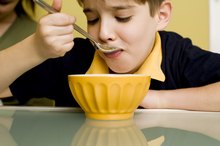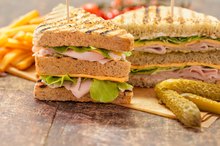What does fact checked mean?
At Healthfully, we strive to deliver objective content that is accurate and up-to-date. Our team periodically reviews articles in order to ensure content quality. The sources cited below consist of evidence from peer-reviewed journals, prominent medical organizations, academic associations, and government data.
- National Institutes of Health: Dairy Dilemma
- National Digestive Diseases Information Clearinghouse: Lactose Intolerance
- MedlinePlus: Constipation-Self Care
- National Digestive Diseases Information Clearinghouse: Celiac Disease
- National Digestive Diseases Information Clearinghouse: Diverticular Disease
The information contained on this site is for informational purposes only, and should not be used as a substitute for the advice of a professional health care provider. Please check with the appropriate physician regarding health questions and concerns. Although we strive to deliver accurate and up-to-date information, no guarantee to that effect is made.
Smoothies for Digestive Problems
Smoothies can be a nutritious meal-on-the-go for the busy professional or a cool afternoon snack for active kids. But if you suffer from certain digestive problems, smoothies can wreak havoc on your intestines. Know which ingredients to add or avoid in your smoothie to alleviate symptoms. Some may actually help improve your digestive health.
If you are experiencing serious medical symptoms, seek emergency treatment immediately.
Lactose Intolerance
If you suffer from lactose intolerance, you may need to keep milk out of your smoothie unless you can drink small amounts without experiencing symptoms. Avoiding dairy, however, can result in calcium deficiency, which can affect your bones, teeth, heart and other muscles. Choose lactose-reduced, almond and soy milks, which all contain adequate amounts of calcium. Or use yogurt, which contains less lactose and more calcium than milk.
- If you suffer from lactose intolerance, you may need to keep milk out of your smoothie unless you can drink small amounts without experiencing symptoms.
- Or use yogurt, which contains less lactose and more calcium than milk.
Constipation or Diarrhea
Wheat Chex Cereal Nutrition Information
Learn More
Adding fiber to your smoothie relieves both constipation and diarrhea. Wheat germ, oatmeal or other grains increase bulk and keeps things moving through your digestive system. Berries, peaches, apricots, plums, prunes and spinach help ease constipation. The University of California San Francisco Medical Center suggests that bananas, along with apricot or peach nectar, can help alleviate diarrhea and replace potassium that may be lost when you have extended bouts of this uncomfortable digestive problem 3.
- Adding fiber to your smoothie relieves both constipation and diarrhea.
- Wheat germ, oatmeal or other grains increase bulk and keeps things moving through your digestive system.
Gluten Sensitivity or Celiac Disease
If you are sensitive to gluten or have celiac disease, you should avoid all wheat, rye, barley and some oat products in your smoothies. All fruits, vegetables and most dairy products are gluten-free. Safe grains include flax, quinoa and tapioca, according to the National Digestive Diseases Information Clearinghouse, or NDDIC.
Diverticular Disease
How to Stop Weight Loss on Vyvanse
Learn More
Diverticular disease is a condition that occurs when small pouches or sacs form and push out from the walls of your colon. These sacs can become inflamed and infected, causing pain and sometimes bleeding. A fiber–rich diet prevents flare-ups. Until recently, people with diverticular disease were encouraged to avoid nuts, corn, popcorn and seeds, including those found in berries and other fruits. However, a 2008 study published in the "Journal of the American Medical Association" found that these foods did not have a negative effect on people with diverticular disease 4. High-fiber smoothies that contain ingredients such as wheat bran, oats, flax, fruits and vegetables can help meet your fiber needs if you suffer from this digestive problem.
- Diverticular disease is a condition that occurs when small pouches or sacs form and push out from the walls of your colon.
- Until recently, people with diverticular disease were encouraged to avoid nuts, corn, popcorn and seeds, including those found in berries and other fruits.
Related Articles
References
Writer Bio
Kristin Mortensen began writing newspaper articles in 1992 for The Sierra Vista Herald. She has also been a registered dietitian since 1991, and has worked for hospitals, clinics and Women, Infants and Children (WIC) programs. Mortensen has a bachelor of science in dietetics from Brigham Young University.









